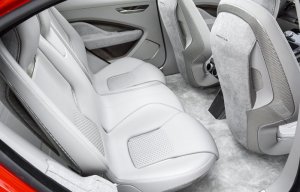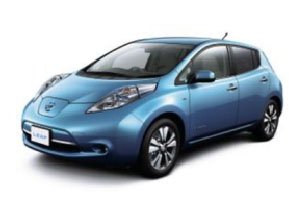
Hypetex adds bespoke carbon to the Jaguar I-PACE
Teijin announced today that its Eco Circle Plantfiber bio-polyester has been selected for use in the seats and interior trim surface of the 100% electric Nissan LEAF, which was updated on November 20. It is the first time Eco Circle Plantfiber has been used for the interior of a mass-produced vehicle.

26th November 2012
Innovation in Textiles
|
Tokyo
The seat and interior trim surface were jointly developed by Teijin, automotive seat manufacturer Suminoe Teijin Techno Co., Ltd. and Nissan Motor Company Ltd. Eco Circle Plantfiber is used for the seats, parts of the door trim, headrests and centre armrest.
According to Teijin, more than 30% of Eco Circle Plantfiber’s composition is made with bio fuels derived from sugarcane and conserves fossil resources and lowers greenhouse gas emissions due to its carbon neutral effects, yet still offers the same characteristics and quality of oil-derived polyester.
Teijin has been expanding Eco Circle Plantfiber’s global market for applications ranging from apparel, car seats and interiors to personal hygiene products. The company aims to increase sales to over 50% of its total polyester fibre sales for automotive seats and interiors by 2015.
This is the second innovation for automotive applications that Teijin has introduced within a week. Last week the company announced its V-Lap lightweight, sound-absorbing polyester material had been selected for use in the carpeting of the new Mitsubishi Outlander, a midsize crossover vehicle that launched in Japan last month.
The flooring was developed by Hayashi Telempu Corporation, a manufacturer of interior automotive parts, and was adopted as the sound-absorbing material for the carpet’s back side. According to Teijin, V-Lap’s vertically oriented nonwoven structure performs every bit as well as conventional sound-absorbing materials yet weighs only half as much. With environmental regulations becoming stricter worldwide, there is a growing demand for solutions that help to improve fuel efficiency, including through vehicle-weight reduction.
Teijin offers advanced solutions in the areas of sustainable transportation, information and electronics, safety and protection, environment and energy, and healthcare. Its main fields of operation are high-performance fibres such as aramid, carbon fibres and composites, healthcare, films, resin and plastic processing, polyester fibres, products converting and IT.
The group has around 150 companies and approximately 17,000 employees spread out over 20 countries worldwide. It posted consolidated sales of JPY 854.4 billion (USD 10.7 billion) and total assets of JPY 762.1 billion (USD 9.5 billion) in the fiscal year ending March 31, 2012.

Business intelligence for the fibre, textiles and apparel industries: technologies, innovations, markets, investments, trade policy, sourcing, strategy...
Find out more